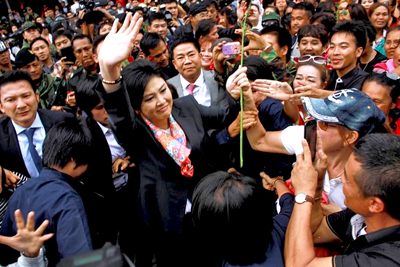 Bangkok, May 8: Thailand's Constitutional Court has dismissed Prime Minister Yingluck Shinawatra and several of her ministers for abuse of power, a ruling that threatens to unleash a new wave of political unrest.
Bangkok, May 8: Thailand's Constitutional Court has dismissed Prime Minister Yingluck Shinawatra and several of her ministers for abuse of power, a ruling that threatens to unleash a new wave of political unrest.
The cabinet swiftly appointed a deputy premier - Niwattumrong Boonsongpaisan - as her replacement, as the ruling party struggled to regain its footing after the judicial blow.
The court, which has played a key role in deposing Shinawatra-linked governments in recent turbulent years, ruled unanimously that Yingluck acted illegally by transferring a top security official in 2011.
'Therefore her prime minister status has ended... Yingluck can no longer stay in her position acting as caretaker prime minister,' presiding judge Charoon Intachan said in a televised ruling.
Nine cabinet ministers who endorsed the decision to transfer Thawil Pliensri were also stripped of their status.
But Niwattumrong, who is also commerce minister, was quickly promoted to the role of caretaker premier, said Phongthep Thepkanjana, another deputy prime minister.
Ruling party officials vowed to press ahead with a planned July 20 election to establish a new government. But that poll date has yet to be endorsed by a royal decree.
The court ruling plunges Thailand deeper into a prolonged political crisis. Anti-government protesters are still on Bangkok's streets and Yingluck's 'Red Shirt' supporters also threaten to rally to defend her, raising fears of clashes.
Jubilant anti-government demonstrators blew whistles outside the court to mark her removal - a key demand of their movement, which is seeking to curb the influence of Yingluck's billionaire brother Thaksin Shinawatra.
Thaksin lives overseas to avoid jail for corruption convictions, but is accused of running the country by proxy through his sister.
'I am happy even though the whole cabinet has not been removed. People who do not respect the law should be thrown out,' protester Linjong Thummathorn said.
The kingdom has been bedevilled by a bitter political schism since 2006 when an army coup deposed former telecommunications magnate Thaksin as prime minister.
He is reviled by the Bangkok elite, middle class and royalist southerners who say he has sponsored nepotism and widespread corruption and who perceive him as a threat to the monarchy.
But he is loved in the poorer north and north-eastern regions and among the urban working class for recognising their burgeoning political and economic aspirations.
They have returned Shinawatra-led or linked governments to power in every election since 2001.
Six months of street protests have left 25 people dead and hundreds wounded in gun and grenade attacks, kindling fears of wider clashes between rival political sides.
Officials of the Puea Thai ruling party stressed the election slated for July remains the only way out of the turmoil and urged pro-government supporters to take to the streets.
'Puea Thai is calling for people who love democracy... to unite against conspiracies (to overthrow the government) by using their right and freedom to rally,' Bhokin Bhalakula, a party legal expert, told reporters.
But anti-government demonstrators in Bangkok are likely to reject the poll. They want an appointed premier to enact loosely-defined 'reforms' to curb the influence of the Shinawatras before elections.
A poll called by Yingluck in February to shore up her battered government was disrupted by protesters and boycotted by the main opposition party.
It was later annulled by the Constitutional Court, enraging Red Shirts who said the judges effectively stole their vote.
- See more at: http://www.skynews.com.au/news/politics/world/2014/05/08/court-removes-thai-pm-shinawatra.html#sthash.gQuJx9gM.dpuf






Comments
Add new comment